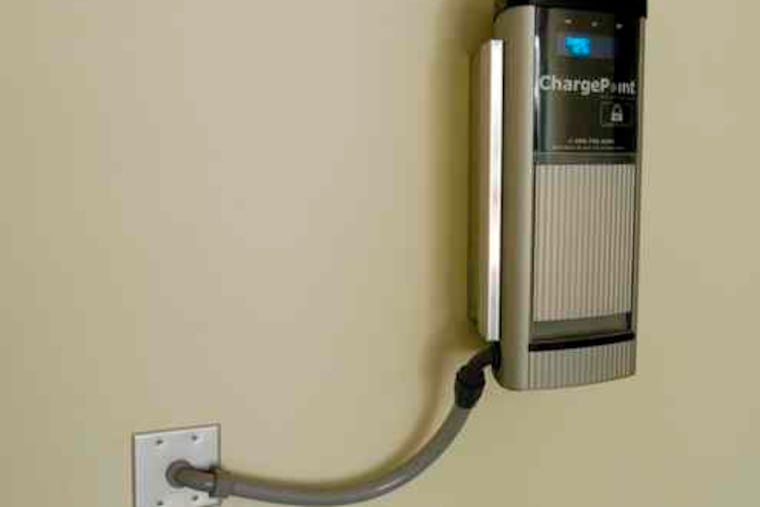A slow push to give electric cars a place to charge
Perched atop the hills of Manayunk, a posh housing development is taking shape, offering buyers a feature that, the developers acknowledge, it's likely nobody will want anytime soon.

Perched atop the hills of Manayunk, a posh housing development is taking shape, offering buyers a feature that, the developers acknowledge, it's likely nobody will want anytime soon.
In Voorhees, a like-minded developer is equipping a medical office building under construction with the same seemingly pointless - for now, anyway - accessory:
An electric-vehicle charger.
And just like that, a two-state experiment begins in a region where plug-in cars are scarce.
It might help resolve the chicken-and-egg quandary perplexing electric-vehicle, or EV, proponents. That is, what has to happen first to get drivers in electric cars: An abundance of such vehicles on U.S. highways? Or a preponderance of stations to charge them? Or both?
The questions are timely. The Obama administration is encouraging EV adoption, in part by providing stimulus money to help establish a network of charging stations. Meanwhile, new lines of EVs are expected in the fall.
In Manayunk, developers Denise Lehmann and Alex Plessett said a desire to build the greenest housing complex possible prompted them to include a 240-volt charging unit in the model home of Sheldon Crossing.
The thinking, Plessett said, was, "We're so green everywhere else, why not do it in the garage?"
Sheldon Crossing will be 20 three- and four-bedroom carriage houses selling from $599,000 to close to $1 million, each loaded with eco-friendly features. Geothermal heat; tankless water heaters; Energy Star windows, doors, and appliances; dual-flush toilets; and green roofs are all standard. Photovoltaic panels are an option because of their significant expense - $38,000 without rebates, grants, or tax credits.
EV charging stations also will be an option, at close to $6,000 each. There is no markup on the price, Lehmann said.
"We're not making any money on that," she said. "We just hope every buyer would opt for that."
Of course, anyone who did would most likely have more shopping to do afterward to make it relevant.
"They may have to go buy an electric car," Plessett said.
Aside from the West Coast, the United States essentially has been an EV non-adopter. The push is on to change that, from the White House to companies hoping to cash in on any electric-car boom.
Among them is Coulomb Technologies Inc., of Campbell, Calif., makers of the charging stations offered at Sheldon Crossing and the four Lee Hudson said he would install by August at the energy-efficient medical office complex his Evesham Building Associates L.L.C. is constructing on Evesham Road in Voorhees.
Until there are EVs to use them, Hudson said, "I'm going to charge my cell phone" on them.
Coulomb recently announced a $37 million initiative to install 4,600 free electric-charging stations in nine U.S. metropolitan areas by September 2011.
The charging stations, funded in part by a $15 million stimulus grant from the U.S. Department of Energy, will be installed in public spaces, businesses and homes in Austin, Texas; Detroit; Los Angeles; New York; Orlando; Sacramento; San Jose/San Francisco; Redmond, Wash.; and Washington.
Coulomb's ChargePoint America program is working with Chevrolet, Ford, and Smart. The automakers have agreed to supply electric vehicles to those nine markets, and others.
Coulomb is trying to ensure that drivers of those cars will have access to enough charging stations, said Jerry Reich, a distributor for the company.
As a Philadelphia native, Reich, 58, who graduated from Northeast High School and now lives in Nashville, is frustrated that he has been unable to trigger a charging-station revolution in the city.
"I think it's going to take a joint effort between the city leaders and a few select business associates that manage some parking facilities to do this," Reich said.
His feet on the street here are Mickey McLaughlin and Dave Soens, partners in South Jersey Green L.L.C. For the last year, they have been pitching charging stations to colleges, airports, car-rental companies, and major employers with large vehicle fleets.
They have encountered plenty of interest, but no takers yet, McLaughlin said.
Katherine Gajewski, director of Philadelphia's Office of Sustainability, said that's because EV charging stations are "a complex issue on a number of levels."
Before making any commitments, she said, the city is planning to study the matter - from the cost of installing an EV charging network to the effect those stations would have on the region's power grid.
Philadelphia also has joined a partnership with New York and Boston to evaluate developing a regional EV infrastructure to support travel among all three metro areas.
"That's the kind of short-term and long-range thinking we want," Gajewski said. "You can't do these things overnight."